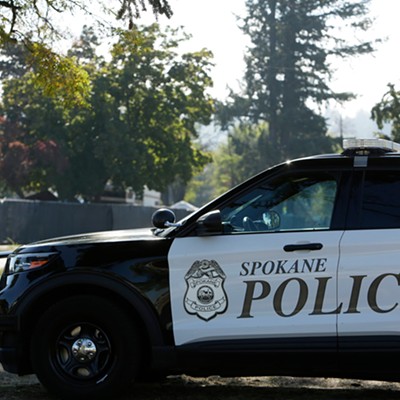News In Brief
[
{
"name": "Broadstreet - Instory",
"insertPoint": "5",
"component": "25846487",
"requiredCountToDisplay": "5"
},{
"name": "Broadstreet - Instory",
"insertPoint": "10",
"component": "25846487",
"requiredCountToDisplay": "10"
},{
"name": "Broadstreet - Instory",
"insertPoint": "15",
"component": "25846487",
"requiredCountToDisplay": "15"
},{
"name": "Broadstreet - Instory",
"insertPoint": "20",
"component": "25846487",
"requiredCountToDisplay": "20"
}
]
by Inlander Staff
Found Money -- SPOKANE -- Ten million dollars is a lot of money to lose. That's how much tax money went unclaimed in 2000, according to Gary Weber, assistant dean of the School of Business Administration at Gonzaga University.
In an effort to give some of this money to its rightful owners, Gonzaga has teamed up with Mayor John Powers' office and the Internal Revenue Service to spread the word about the Earned Income Tax Credit (EITC) to Spokane residents.
EITC is a tax benefit for people with low-income earnings meant to supple-ment their wages and steer them away from welfare
On Saturday, there will be an EITC presentation at Gonzaga University, where about 60 accounting students participating in the Volunteer Income Tax Assistance (VITA) program will determine whether individuals qualify for the tax credit. They'll assist local taxpayers on their tax returns as well.
Representatives from the accounting firms Moss Adams and BDO Seidman will also be available to review returns.
The Gonzaga program is focusing on helping taxpayers who are still working, but a number of other sites throughout the city will help retirees.
-- Leah Sottile
The EITC presentation is at the GU Law School, 721 N. Cincinnati Street, on Sat., Feb. 16, at 10 am. Call 323-3427.
Well, Well, Well -- RATHDRUM, Idaho -- It's getting crowded on the Rathdrum Prairie these days, where a combination of easy access to a natural gas line and the aquifer has created the perfect location for power plants.
Avista and Cogentrix Energy already operate a less than a year old 270-megawatt plant here -- which uses 1.1 million gallons of water a day. Now, two other power plants and one expansion are proposed in the same area.
Cogentrix's proposed plant would be much larger, generating 810 megawatts and using seven million gallons of cooling water a day.
Newport Generation Inc. would like to build a 1,300-megawatt plant, and Avista would like to expand its seven-year-old 170-megawatt plant to 260 megawatts. Those two plants would then use an additional 13 million gallons of water daily.
Local environmentalists on both sides of the state line say the plants will put too much of a drain on the aquifer, especially in times of drought.
Earlier this week, Cogentrix surprised some power plant opponents by announcing that the company plans to buy already existing water rights from local farmers to cover its thirsty plant.
Hearings on the Cogentrix plant are expected to end on Friday, Feb. 15 -- with a final ruling following soon thereafter.
-- Pia K. Hansen
Flying High -- SPOKANE -- Seventy-two pairs of peregrine falcons doesn't sound like very many for the entire state of Washington. But then, there were just five pairs in 1980, so 72 is a huge improvement.
That's why state wildlife officials have proposed downgrading the bird's status from endangered to sensitive.
The state Department of Fish and Wildlife (WDFW) would continue to comment on land projects that could affect peregrines, but at a less urgent level, explains Madonna Luers, spokeswoman for the Spokane office.
"Sensitive means that a species is still vulnerable and we will continue to monitor it," says Luers, "but we don't believe it's in danger of going extinct."
The WDFW is expected to decide on proposed peregrine reclassification at its April 12 meeting. Members of the public have until March 12 to comment on the proposed change.
The peregrine is an aerial hunter that preys on other birds, like pigeons and sparrows. DDT, an insecticide, infected the peregrine's food chain and decimated its population in North America after World War II. Captive breeding and reintroduction efforts coast-to-coast have given peregrines a wing up; in the past 20 years, their populations have steadily grown.
Peregrines in Washington are concentrated in the Puget Sound area and along the coast, although there are also a small number of pairs nesting in the cliffs of the Cascade Mountains, according to WDFW documents.
One pair has been nesting in Spokane for the past several years, according to Luers. That pair returns each spring to nest above High Bridge Park and rear their young, she says.
-- Dan Richardson
Written comments must be mailed before March 12 to the Endangered Species Section Manager, Department of Fish and Wildlife, 600 Capitol Way North, Olympia, WA 98501-1091.
Found Money -- SPOKANE -- Ten million dollars is a lot of money to lose. That's how much tax money went unclaimed in 2000, according to Gary Weber, assistant dean of the School of Business Administration at Gonzaga University.
In an effort to give some of this money to its rightful owners, Gonzaga has teamed up with Mayor John Powers' office and the Internal Revenue Service to spread the word about the Earned Income Tax Credit (EITC) to Spokane residents.
EITC is a tax benefit for people with low-income earnings meant to supple-ment their wages and steer them away from welfare
On Saturday, there will be an EITC presentation at Gonzaga University, where about 60 accounting students participating in the Volunteer Income Tax Assistance (VITA) program will determine whether individuals qualify for the tax credit. They'll assist local taxpayers on their tax returns as well.
Representatives from the accounting firms Moss Adams and BDO Seidman will also be available to review returns.
The Gonzaga program is focusing on helping taxpayers who are still working, but a number of other sites throughout the city will help retirees.
-- Leah Sottile
The EITC presentation is at the GU Law School, 721 N. Cincinnati Street, on Sat., Feb. 16, at 10 am. Call 323-3427.
Well, Well, Well -- RATHDRUM, Idaho -- It's getting crowded on the Rathdrum Prairie these days, where a combination of easy access to a natural gas line and the aquifer has created the perfect location for power plants.
Avista and Cogentrix Energy already operate a less than a year old 270-megawatt plant here -- which uses 1.1 million gallons of water a day. Now, two other power plants and one expansion are proposed in the same area.
Cogentrix's proposed plant would be much larger, generating 810 megawatts and using seven million gallons of cooling water a day.
Newport Generation Inc. would like to build a 1,300-megawatt plant, and Avista would like to expand its seven-year-old 170-megawatt plant to 260 megawatts. Those two plants would then use an additional 13 million gallons of water daily.
Local environmentalists on both sides of the state line say the plants will put too much of a drain on the aquifer, especially in times of drought.
Earlier this week, Cogentrix surprised some power plant opponents by announcing that the company plans to buy already existing water rights from local farmers to cover its thirsty plant.
Hearings on the Cogentrix plant are expected to end on Friday, Feb. 15 -- with a final ruling following soon thereafter.
-- Pia K. Hansen
Flying High -- SPOKANE -- Seventy-two pairs of peregrine falcons doesn't sound like very many for the entire state of Washington. But then, there were just five pairs in 1980, so 72 is a huge improvement.
That's why state wildlife officials have proposed downgrading the bird's status from endangered to sensitive.
The state Department of Fish and Wildlife (WDFW) would continue to comment on land projects that could affect peregrines, but at a less urgent level, explains Madonna Luers, spokeswoman for the Spokane office.
"Sensitive means that a species is still vulnerable and we will continue to monitor it," says Luers, "but we don't believe it's in danger of going extinct."
The WDFW is expected to decide on proposed peregrine reclassification at its April 12 meeting. Members of the public have until March 12 to comment on the proposed change.
The peregrine is an aerial hunter that preys on other birds, like pigeons and sparrows. DDT, an insecticide, infected the peregrine's food chain and decimated its population in North America after World War II. Captive breeding and reintroduction efforts coast-to-coast have given peregrines a wing up; in the past 20 years, their populations have steadily grown.
Peregrines in Washington are concentrated in the Puget Sound area and along the coast, although there are also a small number of pairs nesting in the cliffs of the Cascade Mountains, according to WDFW documents.
One pair has been nesting in Spokane for the past several years, according to Luers. That pair returns each spring to nest above High Bridge Park and rear their young, she says.
-- Dan Richardson
Written comments must be mailed before March 12 to the Endangered Species Section Manager, Department of Fish and Wildlife, 600 Capitol Way North, Olympia, WA 98501-1091.



















